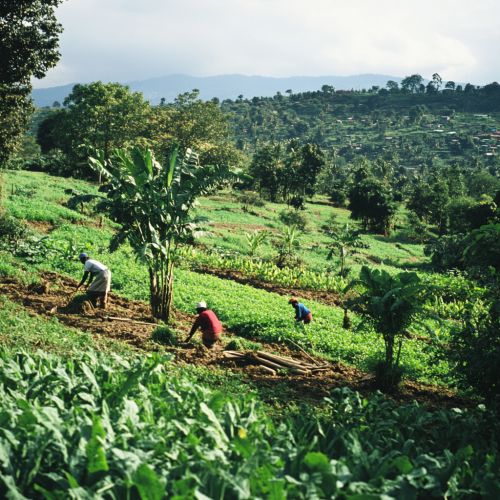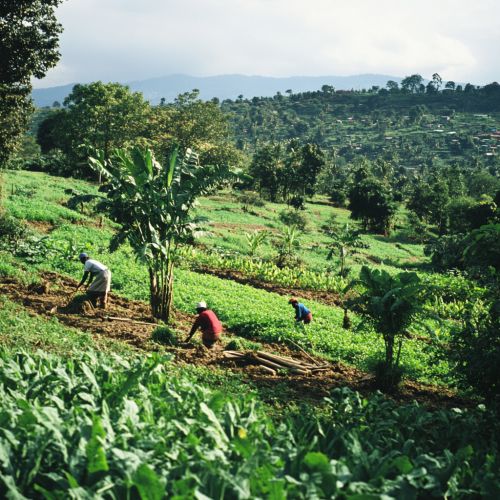Support for Small-Scale Farmers: Difference between revisions
(Created page with "== Introduction == Support for small-scale farmers is a multifaceted endeavor that encompasses a range of strategies, policies, and programs aimed at enhancing the productivity, sustainability, and livelihoods of farmers operating on a smaller scale. These farmers play a crucial role in global food security, biodiversity conservation, and rural development. This article delves into the various dimensions of support for small-scale farmers, including financial assistance,...") |
No edit summary |
||
| Line 47: | Line 47: | ||
Community-supported agriculture (CSA) is a model that connects farmers directly with consumers. In a CSA arrangement, consumers purchase shares of a farm's produce in advance, providing farmers with upfront capital and a guaranteed market. This model fosters a sense of community and shared responsibility between farmers and consumers. | Community-supported agriculture (CSA) is a model that connects farmers directly with consumers. In a CSA arrangement, consumers purchase shares of a farm's produce in advance, providing farmers with upfront capital and a guaranteed market. This model fosters a sense of community and shared responsibility between farmers and consumers. | ||
[[Image:Detail-97423.jpg|thumb|center|Small-scale farmers working in a lush, green field, with crops and simple farming tools visible.|class=only_on_mobile]] | |||
[[Image:Detail-97424.jpg|thumb|center|Small-scale farmers working in a lush, green field, with crops and simple farming tools visible.|class=only_on_desktop]] | |||
== Environmental Sustainability == | == Environmental Sustainability == | ||
Latest revision as of 21:43, 30 July 2024
Introduction
Support for small-scale farmers is a multifaceted endeavor that encompasses a range of strategies, policies, and programs aimed at enhancing the productivity, sustainability, and livelihoods of farmers operating on a smaller scale. These farmers play a crucial role in global food security, biodiversity conservation, and rural development. This article delves into the various dimensions of support for small-scale farmers, including financial assistance, technical support, market access, policy frameworks, and community-based initiatives.
Financial Assistance
Financial assistance is a critical component of support for small-scale farmers. This assistance can take various forms, including grants, subsidies, low-interest loans, and microfinance. Governments, non-governmental organizations (NGOs), and international agencies often provide these financial resources to help farmers invest in essential inputs such as seeds, fertilizers, and equipment.
Microfinance
Microfinance institutions (MFIs) play a significant role in providing small-scale farmers with access to credit. These institutions offer small loans with flexible repayment terms, enabling farmers to invest in their operations and improve productivity. The Grameen Bank model, pioneered by Muhammad Yunus, is a notable example of microfinance tailored to the needs of small-scale farmers.
Subsidies and Grants
Subsidies and grants are often provided by governments to reduce the cost burden on small-scale farmers. These financial aids can cover a range of needs, from purchasing agricultural inputs to implementing sustainable farming practices. For instance, the Common Agricultural Policy of the European Union offers subsidies to support small-scale farmers in maintaining agricultural diversity and rural livelihoods.
Technical Support
Technical support encompasses the provision of knowledge, skills, and technologies that enable small-scale farmers to enhance their agricultural practices. This support is often delivered through extension services, training programs, and research initiatives.
Agricultural Extension Services
Agricultural extension services are crucial for disseminating knowledge and innovations to small-scale farmers. These services provide farmers with information on best practices, pest and disease management, soil health, and sustainable farming techniques. Extension agents often work directly with farmers in the field, offering hands-on training and demonstrations.
Research and Development
Research and development (R&D) initiatives focus on creating and adapting agricultural technologies that are suitable for small-scale farming. These initiatives often involve collaboration between research institutions, universities, and agricultural organizations. Innovations such as drought-resistant crop varieties, integrated pest management (IPM) techniques, and low-cost irrigation systems have significantly benefited small-scale farmers.
Market Access
Market access is a critical factor in the success of small-scale farmers. Ensuring that farmers can sell their produce at fair prices requires the development of efficient supply chains, market information systems, and supportive policies.
Supply Chains
Efficient supply chains are essential for connecting small-scale farmers to markets. This involves the establishment of collection centers, transportation networks, and storage facilities. Cooperatives and farmer organizations often play a key role in aggregating produce and negotiating better prices for their members.
Market Information Systems
Access to market information enables small-scale farmers to make informed decisions about what to produce, when to sell, and at what price. Market information systems (MIS) provide real-time data on market prices, demand trends, and buyer requirements. Mobile technology has revolutionized MIS, allowing farmers to receive timely updates via SMS or mobile apps.
Policy Frameworks
Supportive policy frameworks are essential for creating an enabling environment for small-scale farmers. These policies can address land tenure, trade regulations, and environmental sustainability.
Land Tenure
Secure land tenure is fundamental for small-scale farmers to invest in their land and improve productivity. Policies that recognize and protect the land rights of small-scale farmers, including women and indigenous communities, are crucial. Land reform programs and legal frameworks that facilitate land registration and titling can enhance tenure security.
Trade Regulations
Trade regulations can significantly impact the ability of small-scale farmers to access domestic and international markets. Policies that reduce trade barriers, such as tariffs and quotas, and promote fair trade practices can enhance market opportunities for small-scale farmers. Additionally, certification schemes like Fair Trade and organic certification can help farmers access premium markets.
Community-Based Initiatives
Community-based initiatives are grassroots efforts that empower small-scale farmers through collective action and local solutions. These initiatives often involve the formation of cooperatives, farmer groups, and community-supported agriculture (CSA) programs.
Cooperatives
Cooperatives are member-owned organizations that enable small-scale farmers to pool resources, share knowledge, and access markets collectively. By working together, farmers can achieve economies of scale, reduce costs, and improve bargaining power. Successful cooperatives often provide a range of services, including input supply, credit, and marketing support.
Community-Supported Agriculture
Community-supported agriculture (CSA) is a model that connects farmers directly with consumers. In a CSA arrangement, consumers purchase shares of a farm's produce in advance, providing farmers with upfront capital and a guaranteed market. This model fosters a sense of community and shared responsibility between farmers and consumers.


Environmental Sustainability
Environmental sustainability is a key consideration in supporting small-scale farmers. Sustainable farming practices help preserve natural resources, enhance biodiversity, and mitigate the impacts of climate change.
Agroecology
Agroecology is an approach that integrates ecological principles into agricultural practices. It emphasizes biodiversity, soil health, and the use of natural inputs. Agroecological practices, such as crop rotation, intercropping, and agroforestry, can enhance the resilience of small-scale farming systems.
Climate-Smart Agriculture
Climate-smart agriculture (CSA) aims to increase agricultural productivity while reducing greenhouse gas emissions and enhancing resilience to climate change. CSA practices include the adoption of drought-tolerant crop varieties, conservation agriculture, and efficient water management techniques. These practices are particularly relevant for small-scale farmers who are often vulnerable to climate variability.
Social and Gender Equity
Social and gender equity are important dimensions of support for small-scale farmers. Ensuring that all farmers, regardless of gender, age, or social status, have equal access to resources and opportunities is essential for inclusive development.
Gender Equality
Gender equality in agriculture involves addressing the specific challenges faced by women farmers. Women often have limited access to land, credit, and extension services compared to their male counterparts. Policies and programs that promote women's land rights, provide targeted financial services, and support women's participation in decision-making processes are crucial for achieving gender equity.
Youth Engagement
Engaging youth in agriculture is vital for the future of small-scale farming. Young people bring innovation, energy, and new perspectives to the sector. Programs that provide training, mentorship, and access to resources for young farmers can help attract and retain youth in agriculture.
Challenges and Opportunities
Supporting small-scale farmers involves addressing a range of challenges and seizing opportunities for improvement and innovation.
Challenges
Small-scale farmers face numerous challenges, including limited access to finance, inadequate infrastructure, and vulnerability to climate change. Additionally, market volatility and price fluctuations can impact their income and livelihoods. Addressing these challenges requires coordinated efforts from governments, NGOs, and the private sector.
Opportunities
Despite the challenges, there are significant opportunities for supporting small-scale farmers. Advances in technology, such as mobile applications and precision agriculture, offer new tools for improving productivity and market access. Additionally, growing consumer demand for sustainably produced and locally sourced food presents opportunities for small-scale farmers to tap into niche markets.
Conclusion
Support for small-scale farmers is a multifaceted and dynamic field that requires a comprehensive approach. By providing financial assistance, technical support, market access, and enabling policy frameworks, stakeholders can empower small-scale farmers to thrive. Community-based initiatives and a focus on environmental sustainability and social equity further enhance the resilience and sustainability of small-scale farming systems. Addressing the challenges and leveraging the opportunities will ensure that small-scale farmers continue to play a vital role in global food security and rural development.
